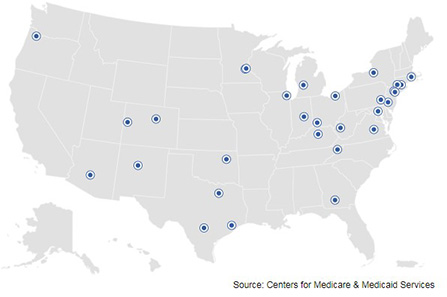Project Overview
The AHC Model is testing whether screening for social needs in clinical settings, referring high-risk Medicare and Medicaid beneficiaries to community services, and helping them navigate those services to address their needs decreases the utilization and cost of health care services.
Social and environmental factors make up 80 percent of the factors that determine a person’s health status, yet they are rarely assessed or addressed by the health care system. Bridging the gap between clinical care and community services may decrease health care costs and improve health.
U.S. Department of Health and Human Services
U.S. Department of Health and Human Services, Centers for Medicare & Medicaid Services
U.S. Department of Health and Human Services, Center for Medicare & Medicaid Innovation
 Health-related social needs such as stable housing, food security, protection from interpersonal violence, utility maintenance, and transportation availability are key drivers of health care utilization and cost. Yet it is often difficult for health care providers and systems to identify such needs and connect patients with appropriate services. To help bridge this gap between clinical care and community services, the Centers for Medicare & Medicaid Services (CMS) launched the Accountable Health Communities (AHC) Model in 2017. The AHC Model initiative is an opportunity to apply a standard approach to identify and address health-related social needs among high-risk Medicare and Medicaid beneficiaries, with the goal of reducing health care utilization and cost. Mathematica supports CMS and AHC Model grantees by providing a peer-learning system, technical assistance, data management, and performance monitoring.
Health-related social needs such as stable housing, food security, protection from interpersonal violence, utility maintenance, and transportation availability are key drivers of health care utilization and cost. Yet it is often difficult for health care providers and systems to identify such needs and connect patients with appropriate services. To help bridge this gap between clinical care and community services, the Centers for Medicare & Medicaid Services (CMS) launched the Accountable Health Communities (AHC) Model in 2017. The AHC Model initiative is an opportunity to apply a standard approach to identify and address health-related social needs among high-risk Medicare and Medicaid beneficiaries, with the goal of reducing health care utilization and cost. Mathematica supports CMS and AHC Model grantees by providing a peer-learning system, technical assistance, data management, and performance monitoring.

Evidence & Insights From This Project

Sharing Social Needs Data Requires Meaningful Partnerships
Health systems need to identify ways to securely share Health Related Social Needs data with clinical and community partners. To use these data in a way that supports care and advances health equity, organizations must not only employ data-sharing technology but also build meaningful relationships.
Learn MoreHealth-Related Social Needs Screening: Promising Practices from the Accountable Health Communities Model
Screening, Referral, and Community Alignment to Address HRSNs: Early Lessons from the AHC Model
Uncovering and Addressing Disparities in Health-Related Social Needs, Social Needs Screening and Navigation
A Spotlight on Aligning Clinical Partners to a Collective Vision to Address Health-Related Social Needs
Leveraging Community Partnerships: How Advisory Boards Advance Screening, Referral, and Navigation Efforts
Planning for Sustainability and Advancing Health Equity during the Public Health Emergency
Related Staff
See Clearly. Act Quickly.
From local to global challenges in health, human services, and international development, we’re here to improve public well-being and make progress together. Learn more about becoming a Mathematica client or partner.
Work With Us










